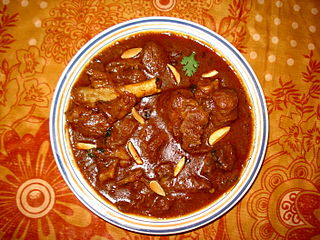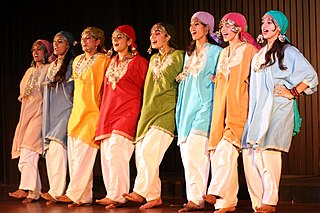Related Research Articles

Saffron is a spice derived from the flower of Crocus sativus, commonly known as the "saffron crocus". The vivid crimson stigma and styles, called threads, are collected and dried for use mainly as a seasoning and colouring agent in food. The saffron crocus was slowly propagated throughout much of Eurasia and was later brought to parts of North Africa, North America, and Oceania.

Kashmiri or Koshur is a Dardic Indo-Aryan language spoken by around 7 million Kashmiris of the Kashmir region, primarily in the Kashmir Valley and Chenab Valley of the Indian-administrated union territory of Jammu and Kashmir, over half the population of that territory. Kashmiri has split ergativity and the unusual verb-second word order.

The Kashmiri Pandits are a group of Kashmiri Hindus and a part of the larger Saraswat Brahmin community of India. They belong to the Pancha Gauda Brahmin group from the Kashmir Valley, located within the Indian union territory of Jammu and Kashmir. Kashmiri Pandits are Hindu Kashmiris native to the Kashmir Valley, and the only remaining Hindu Kashmiris after the large-scale conversion of the Valley's population to Islam during medieval times. Prompted by the growth of Islamic militancy in the valley, large numbers left in the exodus of the 1990s. Even so, small numbers remain.

Rogan josh ; Kashmiri:[roːɡandʒoːʃ]), also spelled roghan josh or roghan ghosht, is an aromatic curried meat dish originating from Kashmir.
Bhat is a Brahmin and Muslim surname in the Indian subcontinent. Bhat and Bhatt are shortened renditions of Brahmabhatta or Bhatta.

The insurgency in Jammu and Kashmir, also known as the Kashmir insurgency, is an ongoing separatist militant insurgency against the Indian administration in Jammu and Kashmir, a territory constituting the southwestern portion of the larger geographical region of Kashmir, which has been the subject of a territorial dispute between India and Pakistan since 1947.

The Jammu Kashmir Liberation Front (JKLF) is a formerly armed, political separatist organisation active in both the Indian-administered and Pakistani-administered territories of Kashmir. It was founded by Amanullah Khan, with Maqbool Bhat also credited as a co-founder. Originally a militant wing of the Azad Kashmir Plebiscite Front, the organization officially changed its name to the Jammu Kashmir Liberation Front in Birmingham, England on 29 May 1977; from then until 1994 it was an active Kashmiri militant organization. The JKLF first established branches in several cities and towns of the United Kingdom and other countries in Europe, as well as in the United States and across the Middle East. In 1982, it established a branch in the Pakistani-administered territory of Azad Jammu and Kashmir, and by 1987, it had established a branch in the Indian-administered Kashmir Valley.

Kashmiri cuisine is the cuisine of the Kashmir Valley. The cuisine has strong influences from neighbouring regions in central Asia and the Indian subcontinent. Rice has been a staple food in Kashmir since ancient times. The equivalent for the phrase "bread and butter" in Kashmiri is haakh-batte.

The Kashmir conflict is a territorial conflict over the Kashmir region, primarily between India and Pakistan, and also between China and India in the northeastern portion of the region. The conflict started after the partition of India in 1947 as both India and Pakistan claimed the entirety of the former princely state of Jammu and Kashmir. It is a dispute over the region that escalated into three wars between India and Pakistan and several other armed skirmishes. India controls approximately 55% of the land area of the region that includes Jammu, the Kashmir Valley, most of Ladakh, the Siachen Glacier, and 70% of its population; Pakistan controls approximately 30% of the land area that includes Azad Kashmir and Gilgit-Baltistan; and China controls the remaining 15% of the land area that includes the Aksai Chin region, the mostly uninhabited Trans-Karakoram Tract, and part of the Demchok sector.
Kashmiri may refer to:

Kashmiris are an Indo-Aryan ethnolinguistic group speaking the Kashmiri language and originating from the Kashmir Valley, which is today located in Indian-administered Jammu and Kashmir.

Cucurbita moschata is a species originating in either Central America or northern South America. It includes cultivars known as squash or pumpkin. C. moschata cultivars are generally more tolerant of hot, humid weather than cultivars of C. maxima or C. pepo. They also generally display a greater resistance to disease and insects, especially to the squash vine borer. Commercially made pumpkin pie mix is most often made from varieties of C. moschata. The ancestral species of the genus Cucurbita were present in the Americas before the arrival of humans. No species within the genus is fully genetically isolated from all the other species. C. moschata can be hybridized with all other species. It has been suggested that this shows that the species of Cucurbita have diversified more recently than those of related genera such as Cucumis and Citrullus.

Pampore, known as Pampar or Panpar in Kashmiri, is a historical town situated on the eastern side of the Jhelum River on the Jammu–Srinagar National Highway. It was known as Padmapura in antiquity. Pampore is about 11 kilometres (6.8 mi) away from Srinagar city centre Lal Chowk. It is primarily known for its cultivation of saffron.

Panun Kashmir is a proposed union territory of India in the Kashmir Valley, which is intended to be a homeland for Kashmiri Hindus. The demand arose after the Exodus of Kashmiri Hindus in 1990. The vision of the homeland was elucidated in the Margdarshan Resolution of 1991. Panun Kashmir is also the name of an eponymously named organization.

Wazwan is a multi-course meal in Kashmiri cuisine, originating from Kashmir.

Anwar Shah Kashmiri was an Islamic scholar from Kashmir in the early twentieth century, best known for his expertise in the study of hadith, a strong memory, and a unique approach to interpreting traditions, as well as the fourth principal of Darul Uloom Deoband. With an ancestral heritage of religious scholarship rooted in Baghdad, he acquired training in Islamic sciences at Darul Uloom Deoband under the mentorship of Mahmud Hasan Deobandi, alongside enjoying a spiritual journey with Rashid Ahmad Gangohi. Initiating his vocation as the first principal of Madrasa Aminia, he embarked on a hajj in 1906 with a sojourn in Medina, dedicated to exploring the depths of hadith literature. Subsequently, he joined Darul Uloom Deoband, serving as the post of Sheikh al-Hadith for nearly thirteen years before choosing Jamia Islamia Talimuddin as his final destination for his academic voyage. Although he displayed limited inclination toward the written word, a handful of treatises flowed from his pen. Yet, the bulk of his literary legacy has been preserved through the efforts of his students, who transcribed his classroom lectures, discourses, and sermons. While the crux of his scholarly work centered on championing the Hanafi school and establishing its supremacy, he also garnered recognition for his comparatively liberal approach to various religious matters. His publications found their place under the patronage of Majlis-i Ilmi, a scholarly institution established in Delhi in 1929. His scholarly credentials received official endorsement with the publication of Fayd al-Bari, a four-volume Arabic commentary on Sahih al-Bukhari, curated by Badre Alam Merathi and published in Cairo, with the financial support of Jamiatul Ulama Transvaal.

The culture of Kashmir encompasses the spoken language, written literature, cuisine, architecture, traditions, and history of the Kashmiri people native to the northern part of the Indian subcontinent. The culture of Kashmir was influenced by the Persian as well as Central Asian cultures after the Islamic rule of Kashmir. Kashmiri culture is influenced by Hinduism, Buddhism and later by Islam.

The Exodus of Kashmiri Hindus, or Pandits, is their early-1990 migration, or flight, from the Muslim-majority Kashmir valley in Indian-administered Kashmir following rising violence in an insurgency. Of a total Pandit population of 120,000–140,000 some 90,000–100,000 left the valley or felt compelled to leave by the middle of 1990, by which time about 30–80 of them are said to have been killed by militants.
Zakir Rashid Bhat was the commander of Hizbul Mujahideen after the killing of Burhan Wani and Sabzar Bhat, who were the former commanders of the same outfit. He later became the chief of Ansar Ghazwat-ul-Hind.

Kashmiri Red Chilies or Kashmiri Laal Mirch are characterized by their ability to give a dark red colour to food, capable of colouring and adding flavour, while at the same time not allowing the food to become too pungent or spicy.
References
- ↑ Sarkar, Sonia (September 16, 2019). "Kashmir, from A to Z: Children's book highlights region's culture". Al Jazeera . Retrieved February 4, 2020.